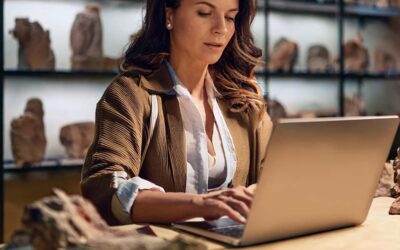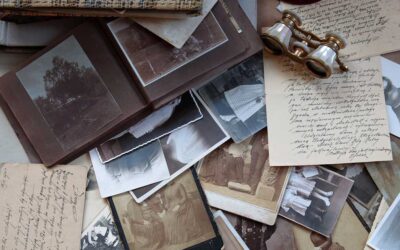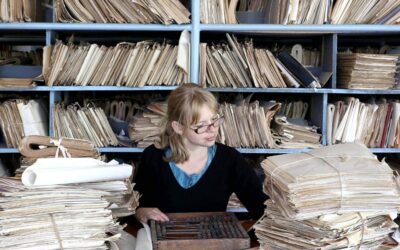Conducting Oral History Interviews: Guidelines for Archivists

Margot Note
Oral history interviews are a powerful tool for capturing and preserving individual stories and experiences.
They provide a unique opportunity to document the perspectives and insights of individuals who have lived through significant historical events or experienced social and cultural changes. The art of conducting oral history interviews includes some essential skills and techniques required to ensure a successful outcome.
Come Prepared
Preparation is key to conducting an effective oral history interview. Before the interview, the interviewer must identify the topic and scope of the interview, research the background and context of the interviewee, and prepare a set of questions to guide the conversation. The interviewer must also establish a comfortable and conducive setting for the interview and ensure that all necessary recording equipment is in place.
Once the interviewer has prepared the groundwork, the interview can begin. The interviewer should start by building rapport with the interviewee and establishing a friendly and welcoming atmosphere to put the interviewee at ease. Doing so helps to create a safe space for the interviewee to share their stories and experiences, allowing the interviewer to elicit deeper insights and emotions.
Being Fully Present
During the interview, the interviewer must use active listening skills to maintain engagement and encourage the interviewee to expand on their answers. The interviewer should be fully present, attentive, and responsive to the interviewee’s words and body language. The interviewer should avoid interrupting or dominating the conversation, allowing interviewees to express themselves freely and fully.
The interviewer must also be mindful of their language and tone, using straightforward, concise questions that avoid leading or judgmental language. Open-ended questions encouraging interviewees to reflect on their experiences and share their perspectives are often more effective than closed-ended questions requiring a simple yes or no response.
As the interview progresses, the interviewer must be flexible and responsive, adapting their approach to the interviewee’s needs and preferences. For example, some interviewees may be more reserved, while others may be more talkative and expressive. The interviewer must be attuned to these differences and adjust their questioning and listening style accordingly.
Being an Ethical Interviewer
Another important aspect of conducting oral history interviews is the ethical considerations involved. Interviewees must be fully informed of the purpose and scope of the discussion and give their informed consent to participate. They should also be able to withdraw from the interview or withhold any information they do not wish to share.
The interviewer must also consider the potential impact of the interview on the interviewee’s emotional well-being and ensure that appropriate support and resources are available if needed. Additionally, the interviewer must take steps to protect the confidentiality and privacy of the interviewee, ensuring that their personal information is not shared without their explicit consent.
Documenting the Experience
After the interview, the interviewer should review and transcribe the recording, accurately capturing the interviewee’s words and emotions. The interviewer should also consider whether follow-up questions or clarifications are necessary and communicate these to the interviewee.
Finally, the interviewer should ensure the interview is properly preserved and accessible for future use. The process involves digitizing the recording (if it is not born digital), adding metadata to facilitate search and retrieval, and ensuring the interview is archived and cataloged.
Worth the Effort
Conducting oral history interviews is a complex and nuanced process that requires careful preparation, active listening, and ethical considerations. However, by following best practices and techniques, interviewers can create a safe and engaging environment that allows interviewees to share their stories and experiences fully and authentically. As a result, oral history interviews are an invaluable tool for capturing and preserving individual perspectives and insights, providing a unique and valuable resource for future generations.

Margot Note
Margot Note, archivist, consultant, and Lucidea Press author is a regular blogger, and popular webinar presenter for Lucidea, provider of ArchivEra, archival collections management software for today’s challenges and tomorrow’s opportunities. Read more of Margot’s posts here.
Never miss another post. Subscribe today!
Similar Posts
Principles of Archival Preservation: Agents of Deterioration and Preservation Strategies
Explore the 5 key agents of deterioration and essential archival preservation strategies to safeguard your collections for future generations.
Creating Effective Archival Finding Aids: Tips for Writing Clear Descriptions
Clear concise archival descriptions improve accessibility support discoverability and enhance the research experience. In this article we’ll explore best practices for crafting finding aids that are both informative and engaging.
Balancing Collection- and
Item-Level Information in Archival Description
How much detail is enough when describing an archival collection? Finding the right balance between broad overviews and detailed item descriptions ensures accessibility research efficiency and proper context for archival materials.
Best Practices in Archival Description
Standards like ISAD(G) DACS and EAD guide archivists in creating clear consistent descriptions for easier access. Learn more about each of these frameworks and how they enhance visibility and research.






Leave a Comment
Comments are reviewed and must adhere to our comments policy.
0 Comments